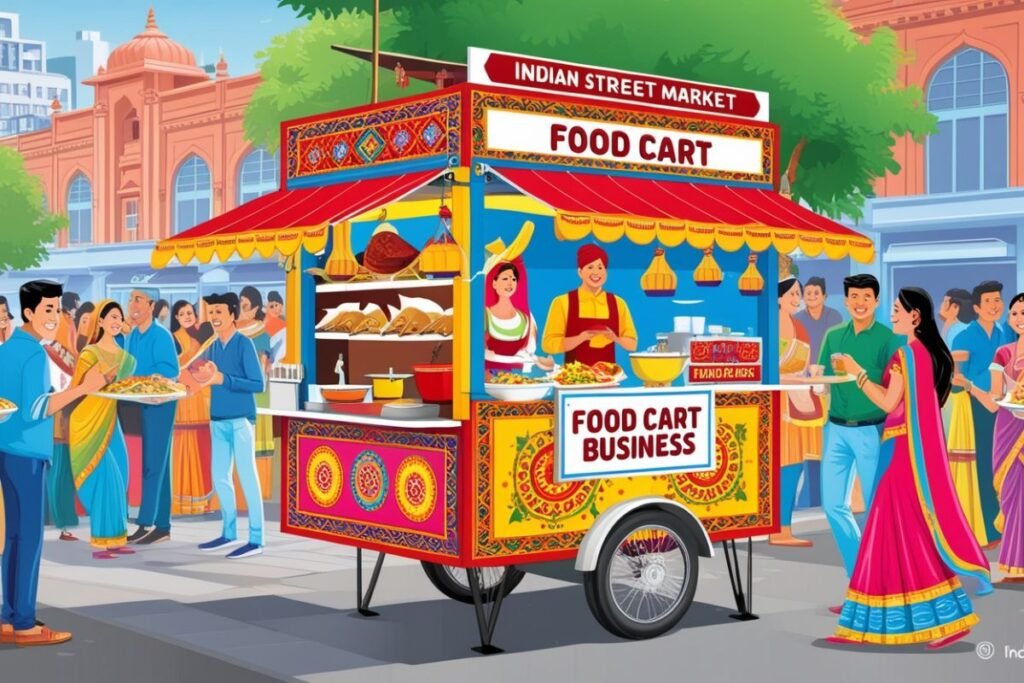The food cart business in India has become a popular and profitable venture due to low setup costs, high demand for street food, and flexibility. Starting a food cart can be an excellent entrepreneurial step, but several essential steps and regulatory requirements need to be considered. Here’s a comprehensive guide to launching a successful food cart business in India.
Table of Contents
Research the Market and Choose Your Niche
Identifying Your Target Market
Before starting, it’s essential to research the local market and understand the preferences of your target audience. Determine if your primary customers will be students, office goers, shoppers, or a mix of demographics.
Selecting a Unique Selling Proposition (USP)
Choose what will make your food cart stand out. You might consider regional specialties, popular fast food items, healthy snacks, or unique international cuisine.
Planning the Menu
Keeping your menu simple yet unique can reduce overhead costs and food wastage. Focus on items that are popular and feasible for a small setup like a food cart.
Create a Business Plan
Defining Your Budget
Calculate your initial investments, including the cost of the cart, equipment, ingredients, and other essential items. Be realistic about daily operational costs.
Choosing the Right Location
Selecting a high-traffic location is crucial for success. Consider areas with heavy footfall, such as markets, street food hubs, office areas, or near colleges.
Establishing a Revenue Model
Determine your pricing, profit margins, and daily revenue targets. This helps in setting financial goals and managing expenses.
Legal Requirements
FSSAI Registration
All food vendors in India, including food carts, are required to obtain FSSAI registration. This registration certifies that your food meets safety and quality standards.
- Basic FSSAI Registration: Small food vendors require a basic registration, which can be applied for on the FSSAI website.
- Documentation: You’ll need identity proof, address proof, and a passport-sized photograph. If your business grows, consider upgrading to a higher license level.
Shop and Establishment License
Certain states require food carts to have a Shop and Establishment License. Verify with your local municipal corporation or panchayat if this applies to your area.
Health or Trade License
In some cities, a health or trade license is necessary to comply with local health and safety regulations. This ensures that your food cart meets sanitation standards.
Choosing and Customizing Your Food Cart
Types of Carts
Choose a cart that aligns with your business needs and menu. The main types include:
- Pushcart: A basic model requiring low investment.
- Motorized Cart: Offers mobility for easy transportation.
- Customized Cart: Equipped with refrigeration, cooking appliances, and storage units as per your requirements.
Branding Your Cart
Adding branding elements like a logo, design, and attractive signage will help your cart stand out. Visual appeal can attract more customers and make your cart easily recognizable.
Procuring Equipment and Ingredients
List the equipment required based on your menu. Essential items may include a gas stove, refrigeration, utensils, and disposable serving containers. It’s important to source fresh ingredients from reliable vendors to maintain food quality and consistency.
Marketing Your Food Cart
Utilizing Social Media
Create social media profiles for your food cart business, especially on Instagram and Facebook. Post updates about new items, locations, and customer reviews to engage potential customers.
Collaborating with Local Influencers
Partnering with local influencers or offering special deals for first-time customers can help increase footfall and brand recognition.
Using Location-Based Advertising
Registering your business on Google My Business can make it easier for nearby customers to locate your food cart, especially in busy areas.
Scaling Up and Company Registration
Benefits of Scaling Up
If your food cart business becomes successful, you may want to expand to multiple locations or even establish a small eatery. Scaling up offers new revenue streams and enhances your brand’s presence.
Advantages of Company Registration
Registering your business provides credibility, legal benefits, and funding options. Customers and potential investors trust registered businesses more, and it opens doors for future investments.
Steps for Company Registration
- Choosing a Business Structure: Decide whether you want an LLP, partnership, or private limited company structure.
- Registering with the Ministry of Corporate Affairs (MCA): File for company registration on the MCA portal.
- Additional Registrations: If your annual turnover exceeds the exemption threshold, obtain a GST number. Register for ESOPs if you plan to hire employees.
Operational Tips for Success
Maintaining Hygiene Standards
Strictly follow health and safety standards. Good hygiene practices enhance customer trust and ensure they return.
Collecting Customer Feedback
Encourage customers to give feedback. Positive reviews can be used for promotion, while constructive feedback can help improve your service.
Ensuring Consistency in Taste and Quality
Consistency in food quality and taste is essential, especially if you expand to multiple locations. Make sure that customers receive the same experience each time.
Starting a food cart business in India can be a rewarding venture with proper planning, regulatory compliance, and effective marketing. Focusing on these elements can help you attract and retain customers. As your business grows, consider company registration to unlock more opportunities, expand your reach, and elevate your brand in the competitive food industry.


